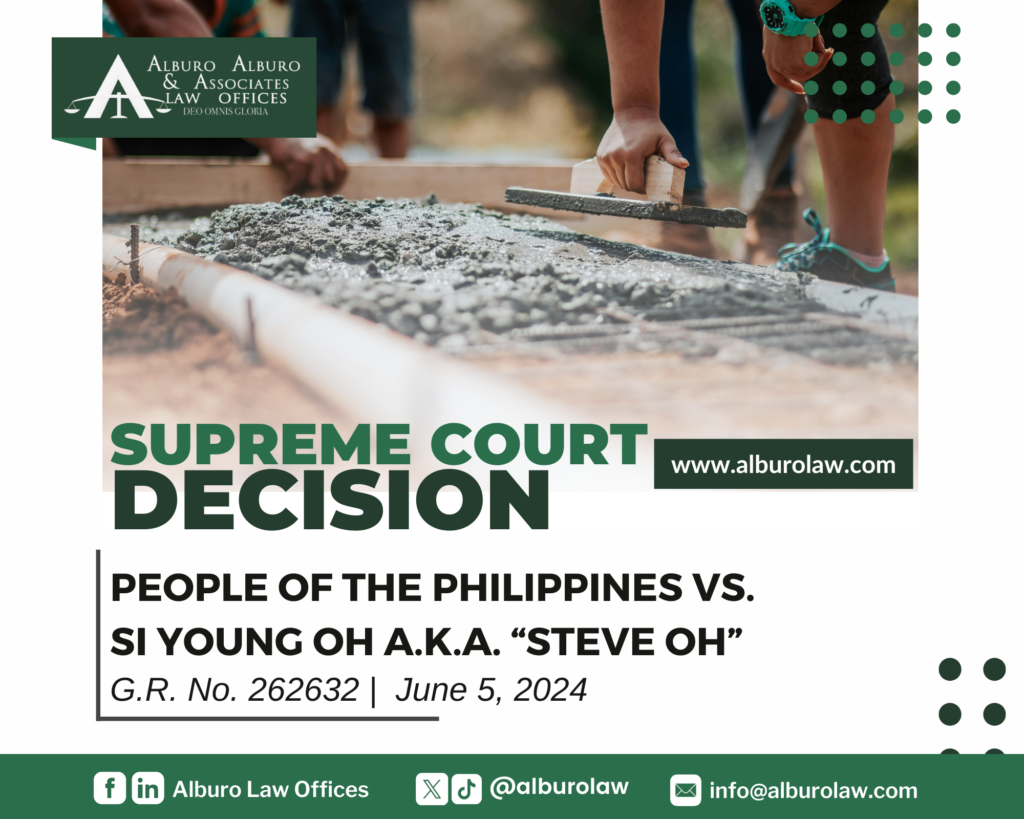
Photo from Pexels | Rodolfo Quirós
The following post does not create a lawyer-client relationship between Alburo Alburo and Associates Law Offices (or any of its lawyers) and the reader. It is still best for you to engage the services of a lawyer or you may directly contact and consult Alburo Alburo and Associates Law Offices to address your specific legal concerns, if there is any.
Also, the matters contained in the following were written in accordance with the law, rules, and jurisprudence prevailing at the time of writing and posting, and do not include any future developments on the subject matter under discussion.
AT A GLANCE:
In the case of PEOPLE OF THE PHILIPPINES vs. SI YOUNG OH a.k.a. “STEVE OH,” G.R. No. 262632, June 5, 2024 the Supreme Court reiterated the well-settled rule that the consent of the minor victim is immaterial in human trafficking cases.
Si Young Oh is a pastor who belongs to the Korean Christian Presbyterian General Assembly, a religious organization based in South Korea. He moved to Pampanga in March 2008, claiming that he received a vision to go to the Philippines, to build 100 churches and educate 1,000 pastors and 10,000 church workers.
However, after his assumption as the head of the church in Pampanga, the Department of Social Welfare and Development and the National Bureau of Investigation received reports that Si Young Oh took advantage of the students by making them render hard labor either for free or at measly allowances, as small as PhP50.00.
The persons who testified against Si Young Oh were AAA, BBB, and CCC, who are all minors. According to these minors, some of the tasks assigned to them by Si Young Oh were collection and carrying of hollow block, gathering debris, welding, “pagbabakbak,” “paghahakot ng semento,” and “paglalagay ng hollow blocks.” Worse, some of them were required to work from 8:00 a.m. until 3:00 a.m. the following day. CCC also relayed that apart from the students, no other person worked at the construction of the seminary’s buildings. CCC and the other students were told that their work in constructing the dormitory and the church served as training grounds for them, and that their “labor is not in vain.”
In defense, Si Young Oh reiterated that he did not force these students to render manual labor. Rather, the students themselves volunteered to help construct the seminary’s facilities.
The RTC rendered a Judgment finding Si Young Oh guilty of violation of Section 4(a) in relation to Section 6(a) and (c) of Republic Act No. 9208 or the Anti-Trafficking in Persons Act of 2003. The CA ruled that the prosecution had clearly established all the elements of Qualified Trafficking.
Issue: Whether Si Young Oh is guilty of violation of Section 4(a) in relation to Section 6(a) and (c) of Republic Act No. 9208.
THE SUPREME COURT’S DECISION
Si Young Oh is guilty of Qualified Trafficking under Republic Act No. 9208. The prosecution clearly established the elements of the said crime, particularly, that Si Young Oh:
(a) committed the act of recruiting AAA, BBB, and CCC to become students and transported them within national borders;
(b) by means of fraud and deception, as well as taking advantage of the vulnerability of AAA, BBB, and CCC; and
(c) for the purpose of exploiting them through forced labor and servitude.
AAA, BBB, and CCC were recruited to study theology and become pastors or missionaries of the Korean Christian Presbyterian General Assembly. To further entice them into accepting the offer, they were told that they would not pay any fees and that their education would be free of charge.
Under Section 6(a) and (c)58 of Republic Act No. 9208, the crime of Trafficking in Persons becomes Qualified by reason of the minority of AAA, BBB, and CCC and the same being committed in large scale. Trafficking in Persons is committed in large scale if there are three or more victims, whether individually or as a group.
The Court emphasized that the consent of the minor victim is immaterial in human trafficking cases. In Planteras, Jr. v. People, it has been held that knowledge or consent of the minor is not a defense under Republic Act No. 9208. The victim’s consent is rendered meaningless due to the coercive, abusive, or deceptive means employed by perpetrators of human trafficking. More importantly, Section 3(a) of Republic Act No. 9208 provides that the crime subject of this case is punishable “with or without the victim’s consent or knowledge,” and that the means employed by the accused is irrelevant when the victims are minors.
LIFE IMPRISONMENT FOR SI YOUNG OH
Section 10(c) of Republic Act No. 9208 prescribes the penalty of life imprisonment for Qualified Trafficking in Persons, and a fine of not less than PHP 2 million but not more than PHP 5 million. These were properly imposed by the RTC and, thereafter, affirmed with modification by the CA. It is worthy to stress that in view of Article 39(3)62 of the Revised Penal Code, no subsidiary imprisonment shall be imposed against Si Young Oh in case he is unable to pay the fine due to insolvency.
People of the Philippines vs. Si Young Oh a.k.a. “Steve Oh”
G.R. No. 262632 | June 5, 2024
Click here to subscribe to our newsletter
Alburo Alburo and Associates Law Offices specializes in business law and labor law consulting. For inquiries regarding legal services, you may reach us at info@alburolaw.com, or dial us at (02)7745-4391/ 0917-5772207/ 09778050020.
All rights reserved.


